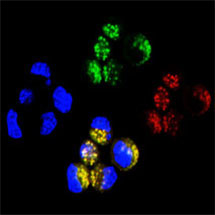 The deposition of misfolded proteins is a central characteristic of many devastating diseases including neurodegenerative diseases such as Alzheimer’s, Parkinson’s, Huntington’s, amyotrophic lateral sclerosis and prion diseases. In principle, improving the cells’ ability to deal with misfolded proteins should reduce the pathology in these diverse neurodegenerative diseases.
The deposition of misfolded proteins is a central characteristic of many devastating diseases including neurodegenerative diseases such as Alzheimer’s, Parkinson’s, Huntington’s, amyotrophic lateral sclerosis and prion diseases. In principle, improving the cells’ ability to deal with misfolded proteins should reduce the pathology in these diverse neurodegenerative diseases.
A study led by Anne Bertolotti has identified a novel, selective and safe pharmacological approach to boost the Unfolded Protein Response (UPR), a natural cellular defense against misfolded proteins, which is defective in several diseases.
The scientists found a small-molecule, guanabenz, which selectively inhibits the negative feedback loop that terminates the UPR and thus prolongs the protective effect of the UPR. Guanabenz binds and inhibits a stress-induced regulatory subunit of the protein phosphatase 1, PPP1R15A/GADD34, thereby rescuing cells from protein misfolding stress.
This inhibition takes place without affecting the highly related regulatory serine/threonine phosphatase, PPP1R15B/CReP, revealing that guanabenz is truly selective – a crucial finding because other serine/threonine phosphatase inhibitors, targeting catalytic subunits, are unselective and toxic.
Because many cellular processes are controlled by about 100 different serine/threonine phosphatases, the same principle – selective inhibition of serine/threonine phosphatases by targeting specific regulatory subunits – could potentially be exploited to design new drugs that could benefit a broad range of diseases. 30% of pharmaceutical company drug discovery programmes focus on kinases. This study shows that serine/threonine phosphatases can also be safely and selectively inhibited by targeting their regulatory subunits, establishing that serine/threonine phosphatases are promising drug targets.
The work, funded by the Medical Research Council, was undertaken by Pavel Tsaytler, in Anne Bertolotti’s lab in the MRC Laboratory of Molecular Biology, with the participation of Heather Harding and David Ron from the Institute of Metabolic Science in Cambridge.
Further references:
Full article in Science
Science Perspective article
Anne Bertolotti’s Group Page